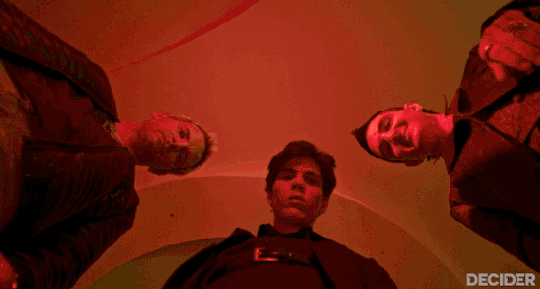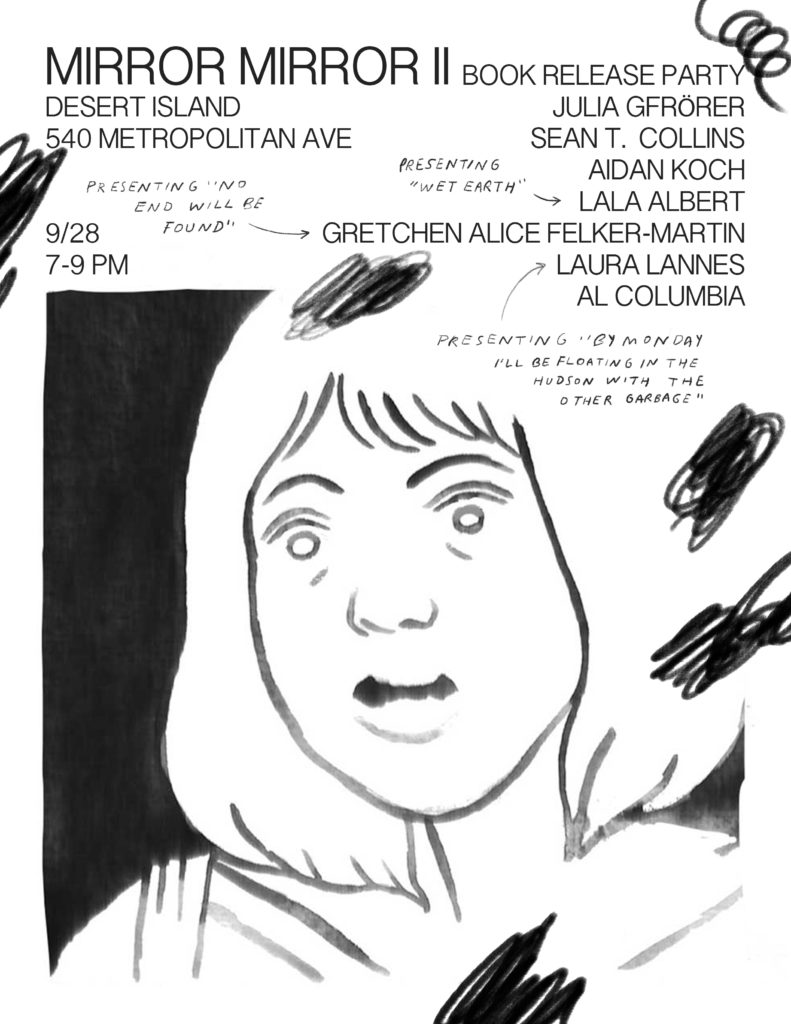

At last, the Boiled Leather Audio Hour t-shirt of your dreams can be yours!

The first thing you notice about Suburra: Blood on Rome, Netflix’s new Italian crime drama, is…well, let’s be frank here. It’s the gigantic coke-fueled priest orgy.
The second thing you notice is that the men on the show are incredibly handsome.
I’m covering Suburra for Decider, starting with this review of the series premiere. The cast is stunning and the score, by Loscil, is lush like little else on TV right now. Worth a look!


 Because I’m a moron I forgot to promote the ToyFare Magazine 20th Anniversary panel I hosted at the New York Comic Con today on my blogs. Ah well, dozens of people showed up to hear about a magazine that hasn’t been published in years. I got to see old friends and meet guys like Matt Senreich and Tom Root from Robot Chicken who worked there before I did. Rad. (How had I never heard the story about the suicide prank before?)
Because I’m a moron I forgot to promote the ToyFare Magazine 20th Anniversary panel I hosted at the New York Comic Con today on my blogs. Ah well, dozens of people showed up to hear about a magazine that hasn’t been published in years. I got to see old friends and meet guys like Matt Senreich and Tom Root from Robot Chicken who worked there before I did. Rad. (How had I never heard the story about the suicide prank before?)
Punisher comics have gotten pretty weird over the years
We know what you’re thinking: Gun-toting combat veteran goes kill-crazy against criminals after they murder his family – this concept is pure meat-and-potatoes street-level stuff, right? But we’re talking about superhero comics, folks. After a few decades of near-continuous publication, pretty much every character gets pushed out of his or her comfort zone, and our the Punisher is no exception.Among his strangest adventures? The Punisher: Purgatory (1998-99), in which the then-dead vigilante was revived to serve as an angelic demon-slayer. The similarly supernatural FrankenCastle arrived a decade later; this knowingly screwball storyline saw the antihero, who had been killed once again, brought back as a Frankenstein-like monster, fighting alongside horror-tinged characters like Morbius the Living Vampire and Man-Thing. (In a word: No.) In 2012, the character got a sci-fi makeover in Space: Punisher – which featured, yes, the Punisher in space, punishing aliens and whatnot.
Years before his character-defining run on the character, Garth Ennis wrote the one-shot Punisher Kills the Marvel Universe, which pretty much does what it says on the tin. The 1995 special chronicles a short, bloody alternate timeline in which Castle’s family gets killed in the crossfire of an X-Men/Avengers battle, leading him to slaughter every single superhero and supervillain in the company’s catalog. He eventually turns the gun on himself. But for sheer WTF-itude, nothing beats 1994’s Archie Meets the Punisher, a crossover between Marvel’s bloodiest antihero and Betty, Veronica, Jughead and the rest of the Riverdale gang. Sure, it’s just a footnote in Punisherology, but crazy stunts like this are exactly what brought Archie back to pop-culture prominence over two decades later. A crossover between the Netflix Punisher show and Riverdale doesn’t sound completely out of the question now, does it?
In anticipation of the upcoming Netflix/Jon Bernthal series, I wrote a guide to the Punisher’s many multimedia incarnations for Rolling Stone. One thing this reminded me is that the showrunner is Steve Lightfoot, who was the Ed Burns to Bryan Fuller’s David Simon on Hannibal. That bodes well.
SPOILER ALERT
Extraordinary even by the series’ own elevated standards, “Who Needs a Guy” provided the crushing payoff for four years of Halt and Catch Fire. It’s not the first time the show has tugged on its many strings until they all either knotted or came apart in a single scene; the conference-room battle between Cameron and Donna last year comes to mind just for starters. Nor is it the first time the show has handled a character’s death with sensitivity but without sentimentality; again, it did so last season with the suicide of Joe’s apprentice Ryan. But it is the first time these two strengths have been combined, and the effect is stunning, like getting hit with a feather and, somehow, being knocked clear across the room. Written by Lisa Albert and directed by Tricia Brock — both of whom effectively abdicate the episode’s awful final minutes to the show’s surviving core cast, about the smartest thing a writer and director could do — it’s one of the hours we’ll turn to when we want to make the case that Halt and Catch Fire is one of the finest dramas of the prestige-TV era. It left me a wreck for hours. I’m still gutted. I loved it.
I reviewed this weekend’s absolutely stunning episode of Halt and Catch Fire for Decider.
it’s not the story’s bleakness that’s the problem — a show about the desperately impoverished and routinely victimized has every right to be dour. It’s the drab story-telling that rankles here. Every scene lands with a thud, a stepping stone toward the next plot or character beat. You can rattle off descriptions without once needing to dig for layers of meaning: “Paul has dinner with his wealthy lawyer boyfriend, who’s nervous about being outed.” “Darlene shows Abby how to mend a broken shoe, a practical skill the slumming rich girl has never needed to learn.” “The mob beats a construction worker who wasn’t playing ball to keep his coworkers in line.” Quick: Can you think of a single scene in this show that would require more than one sentence to sum up?
I reviewed this week’s episode of The Deuce for Rolling Stone. It suffers from the exact problem the Evil Editor diagnosed in the awful fifth season of The Wire: “If you leave everything in, soon you’ve got nothing.” Basically, it’s juggling so many characters that it has no time to do anything complex with any of them, except maybe Candy, who deserves way more time. The fact that there are two James Francos crammed into this thing says a lot.
Which characters’ heads are we hoping hardest to get inside of for the first time in The Winds of Winter? That’s the simple question posed by listener/subscriber Pascal, and the answers lead to a short but sweet episode of BLAM, our Patreon-exclusive mini-podcast. Note that we’ve exhausted all of our $10-level questions, so if you wanna move to the front of the line for our next episode, up your ante to ten bucks a month and ask away! And if you’re not a subscriber yet, pledge $2 a month and listen in!
Despite the abundant charms of this episode, problems remain. Why is James Franco playing twins? Like, narratively speaking? It’s easy to understand stunt casting like this when it enables writers to depict two distinct personalities using a single actor, insinuating that they’re two competing aspects of human nature. That’s how Kyle MacLachlan’s Dale Cooper/Dougie Jones/Coop-elganger Twin Peaks trinity worked; it animated Ewan McGregor’s performances in Fargo‘s last season as well.
But Vinnie and Frankie are more like two peas in a pod than two sides of the same coin. They look alike, they sound alike, they groom their facial hair alike. They even work at the same place for the same mobster boss. In theory, Vincent’s way more responsible – working man, business owner, yadda yadda. He’s also more likable, able to get along with pimps, prostitutes, cops, mafiosi, straight waitresses, gay customers and even violent vagrants like this episode’s sinister breakout character Big Mike. But is the way he ran out on his wife and kids to make a new life for himself in Manhattan really any less reckless than his brother racking up gambling debts or busting open jukeboxes to steal their cash? On the flipside, is Frankie’s boyish charm really that different from his more straight-and-narrow brother’s people skills?
This weekend I was tweeting excitedly about how good Halt and Catch Fire is. A friend, no stranger to the world of TV drama, replied, “It’s back???” This speaks poorly of how the critical community is covering Halt and Catch Fire. As of this week’s episode, “A Connection Is Made,” it’s one of the richest, loveliest, most unsparing, most humane dramas of the year. And think about the year of dramas we’ve had! We should never, ever shut up about this thing.
I wrote about this weekend’s sumptuous Halt and Catch Fire for Decider.
“An end to foreign invasions. An end to borders. The total dismantling of the prison-industrial complex. Healthcare, housing, food and water acknowledged as an inalienable human right. The expert fuckers who broke this world never get to speak again.” Godspeed You! Black Emperor’s demands are firm, but, you know, fucking fair.
These demands come attached to a press release for the band’s new album, Luciferian Towers—a title that recalls the fiery horror that befell London’s Grenfell Tower and the gruesome class inequity that disaster exposed just weeks before the album was announced. Song titles include “Anthem for No State” and “Bosses Hang.” Fire courses through the “context” provided by the band in a press release: “We recorded it all in a burning motorboat.” “The wind is whistling through all 3,000 of its burning window-holes!” “The forest is burning and soon they’ll hunt us like wolves.” By the sound of it, post-rock’s most overtly political and unapologetically powerful band seems ready to toss the ravenous zombie corpse of neoliberalism on the pyre for good and all.
Seen in that infernal light, the sound of Luciferian Towers is the last thing you’d expect. The pulverizing, prophet-of-doom riffs that characterized Allelujah! Don’t Bend! Ascend! and Asunder, Sweet and Other Distress, the band’s previous two albums, are gone. So are the six-to-ten-minute stretches of drone—the anxious calm before those records’ storms. Ominous field recordings—a one-time Godspeed sonic standby, already pared down to a minimum on Allelujah! and eliminated entirely on Asunder—are again nowhere to be found. The album barely even hits minor-key territory until six tracks in, before resolving the melody into a more uplifting mode within a couple of minutes. If you’re looking for Lucifer, search elsewhere.
I reviewed Luciferian Towers, the new album by Godspeed You! Black Emperor, for Pitchfork.

MIRROR MIRROR II
signing and book release party
Thursday, September 28th
7-9pm
Desert Island
540 Metropolitan Ave.
Brooklyn, NY
featuring
Lala Albert
Sean T. Collins
Al Columbia
Gretchen Alice Felker-Martin
Julia Gfrörer
Aidan Koch
Laura Lannes
Also debuting the latest new works from these authors:
-Wet Earth by Lala Albert | Sonatina
-By Monday I’ll Be Floating in the Hudson with the Other Garbage by Laura Lannes | 2dcloud
-No End Will Be Found by Gretchen Alice Felker-Martin | Thuban Press
poster by Laura Lannes
In the closing montage, Donna loads up Cameron’s infamously difficult video game, while Gordon digs up the painstakingly maintained journals he’d been keeping of his deteriorative brain condition’s progress. Donna cracks the code that had thwarted so many players: Instead of trying to choose a path forward, you move upward instead, beginning a beautiful journey that leads you back home. As she does this, Gordon takes his journals and throws them into the fireplace, seemingly determined to live in the now and stop worrying about the future altogether. The accompaniment for the sequence is PJ Harvey’s “Rid of Me,” a song in which Harvey simultaneously brags about how she’s so irresistible her ex will never want to be free of her, but will wish he never met her all the while. Sound familiar?
I reviewed last week’s episode of Halt and Catch Fire for Decider. This week’s review coming soon.
The ‘Game of Thrones’ Season Seven Post-Game Show
You wanted it, you got it. Sean & Stefan vs. Game of Thrones Season 7. ’Nuff said! NOTE: Since a lengthy illness on Sean’s part prevented us from getting this episode out in a timely fashion, we’re rushing it to you with minimal editing. Ooh baby we like it raw!
Additional links:
Sean’s Game of Thrones tag at seantcollins.com, featuring links to all his work on this season for Rolling Stone, Vulture, In These Times, and more.
Our Patreon page at patreon.com/boiledleatheraudiohour.
Our PayPal donation page (also accessible via boiledleather.com).